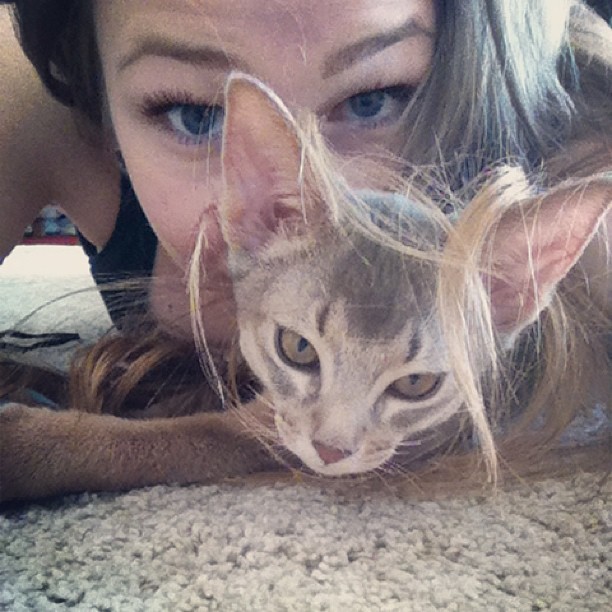Did you watch the great campaign #LikeAGirl from Always? If not, I highly suggest you watch it:
Regardless of how much happiness this video brought me, it disappeared right away as I started to read the comments on YouTube. I feel like the same reaction is constantly happening over and over again. For each diversity question that gets attention in the media, there is this enormous crowd that gets offended, saying that diversity has gone to far.
Once again. No. It has not gone to far. In so many ways, it has not gone to far. This instance of subconsciously pairing words associated with the female gender with something bad or weak is only one among several problems. The worst thing is that everyone, men and women alike, make these associations.
My first experience with this was in early elementary school, maybe the second grade. I started playing handball at an early age so my motor skills were quite good early on. One would think that it might have made me popular in gym class, but what it actually did was to turn my male classmates against me. In games like killerball and king where it really is all against all, my male classmates cooperated to just to get me out of the game, inciting each other on not losing against a girl (where did that view come from?!). I can still remember how upset I got by being treated that unfair, why could they not just accept me?
Some years later the situation changed. I was now accepted by male friends on the premise that I was not like a girl. And I took pride in this. I was agreeing to the picture of girls being inferior, I saw myself as an exception, as one of the guys. When I started high school I was the only female in my class, with no people I knew from before. Here comes what I think is one of the most devious things with this story. Me joining in on mocking females and female “traits” was so positively met by my new classmates to the point where that behaviour got reinforced in me. It was an easy way of being accepted, and it continued to be for several years.
It’s not until recently that I’ve actually started to really reflect on these problems and how hard it can be to notice the invisible norms and barriers. I feel somewhat desensitized from have spending so much time in an all-male environment. Even though I nowadays see myself as highly aware of diversity and gender issues, I got proven wrong just the other day.
I was at the pub with the other interns (we are three females among the interns, and we were pretty much the only females at the pub) when we started chatting with a group of guys (not interns) we hadn’t talked to before. Pretty quickly they started making jokes with pretty explicit sexual content. At this point, one of the other females left the conversation without me really noticing, as I thought she just turned to speak to someone else for a while. Sometime later my male friend turned to me and told me why my female friend had left the conversation. She had gotten really offended by these guys, which is a totally reasonable reaction. I had fallen into my easy way of handling an awkward situation by laughing it off, which I have done so many times before. Then my friend jokingly said:
“She should be more like you”
That struck me hard. Her reaction was more reasonable than mine really, these guys should not have created that situation from the beginning. Sure if you know someone well, but these were people we just had met. It was inappropriate and disrespectful.
It’s hard. We must continue to question this behaviour and raise awareness if we want to make a difference. Even though it might feel like an impossible fight to win sometimes, I’m happy to see more and more people fighting for equality. You don’t always have to pick fights, but just saying “come on, not cool” can be enough to remind someone. Next time I’m saying no.
/Sofie





5 Comments
Jessika · July 3, 2014 at 9:01 pm
Så rätt, på alla punkter!
Jag såg nyss ett avsnitt av Orange is the New Black (som Netflix producerar), S02E06 och blev helt chockad när en av männen i serien kläcker ur sig “Tell you something about women, Pal. With women you make them think you’re meeting them halfway, but really what you’re doing is that you’re meeting them about 10-15% of the way. WOMEN ARE REALLY BAD AT MATH.” Alltså ursäkta mig men hur tänkte de här? Man blir ju så trött, att det är så få mediekanaler som vågar bryta mot normerna.
lisa · July 4, 2014 at 5:41 am
Jättebra inlägg! Håller med dig! Vi måste ifrågasätta könsstereotypa roller och beteenden och få de att brytas och nyanseras istället för att återskapas! Jag har märkt de gånger jag vågat säga ifrån och säga emot att bli behandlad på ett sätt med argumentet att jag är tjej eller inte som en tjej osv. att jag blir stärkt efteråt. Att inte ta skiten utan reagera ökar min självkänsla och självförtroende.
Sofie · July 5, 2014 at 10:03 am
@Jessica: Sjukt intressant att du säger det, vet att jag också hajade till och blev rätt äcklad när jag såg det. Trots att det bara är en rollfigur så blir det ändå väldigt fel…
@Lisa: Tack för att du säger det! Jag håller med, en måste kunna säga ifrån och bli respekterad, det är inte konstigare än så.
The sex, the city and the hypothetical engineering girl · July 5, 2014 at 7:03 am
[…] ta ta mig f*n går alldeles utmärkt att vara tjej och ingenjör bland en massa manliga kollegor? (Även om det i vissa fall kan vara svårt) Hade inte det varit lite roligt? Bara […]
Att vara en kvinna bland män | En doktor i gjuteriet · August 21, 2014 at 2:09 pm
[…] Läs hela Sofis inlägg här: Being a female among males. […]